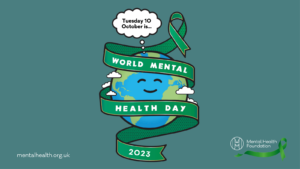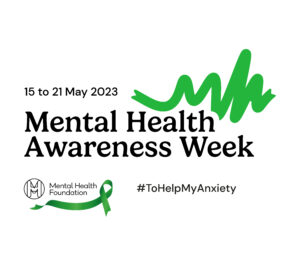Latest News
World Mental Health Day 2023
 Today (Tuesday 10 October 2023) is World Mental Health Day and the theme for this year is ‘Mental health is a universal human right’. World Mental Health Day is observed every year, with the overall objective of raising awareness and breaking down the stigma of mental health issues around the world.
Today (Tuesday 10 October 2023) is World Mental Health Day and the theme for this year is ‘Mental health is a universal human right’. World Mental Health Day is observed every year, with the overall objective of raising awareness and breaking down the stigma of mental health issues around the world.
The stigma and discrimination experienced by people who experience mental ill health not only affects that person’s physical and mental health, stigma also affects their educational opportunities, current and future earning and job prospects, and also affects their families and loved ones. (Source: World Federation for Mental Health [WFMH])
Take a look at our social media channels for posts throughout the day: Instagram, Facebook, Twitter and TikTok.
Prioritise your mental health
Your mental health should be your priority because it impacts our whole life. We want to raise as much awareness as possible on this World Mental Health Day, and to remind you that Community Living Well is here for you.
We offer the following services:
- Talking Therapies – Short-term support for when you experience difficult emotions, such as, low mood, worry, stress and anxiety.
- Peer Support – Wellbeing workshops, one-to-one peer support, peer support groups, social activities and peer support training with other people who have had similar experiences to you.
- Employment – Advice and support to gain and retain paid employment, improve your employability skills and know your rights in the workplace.
- Navigators – Practical support with a range of issues including benefits, debt, housing options, access to health and social care services and support to access specialist advice and information.
- Self-Care – Support and activities that help you to take care of your own mental, emotional and physical wellbeing.
You can refer yourself to the Community Living Well service here.
These local organisations also offer crucial support.
Author: Stewart Gillespie
Category: Community Living Well
Posted on: 10th October 2023
Peer Support: Alain’s Story
 A couple of years ago, Alain experienced a traumatic health scare which led to anxiety, panic attacks and eventually, severe depression.
A couple of years ago, Alain experienced a traumatic health scare which led to anxiety, panic attacks and eventually, severe depression.
He lost his confidence, stopped doing the things he enjoyed, and distanced himself from friends and family. A friend recommended he try peer support. Alain shared his story with us and explained how peer support is helping his recovery.
How did you first hear about Peer Support? Could you tell us a little bit about what you were going through which led you to seek support?
About two years ago, I had a very traumatic operation. It was an emergency operation, I had sepsis, and it was at the height of the pandemic. I ended up suffering a lot of very traumatic post-op difficulties. I started having anxiety on a level I have never experienced; I had panic attacks, I stopped going out. It quickly led to depression, and as the time passed it became very severe. I kept myself from friends, all the things you shouldn’t do, but I didn’t realise that at the time.
I had reached a point where I could no longer connect with people, even with close friends. I was locked in my head. It was absolutely incredible. And physically it had a great impact as well. I found walking difficult, I was always dizzy, I had panic attacks. It was a terrible time. A friend had told me about Kensington & Chelsea Mind, so I got in touch. Initially, I tried going to the social gathering they have at the beautiful church in Ladbroke Grove, but I was still in a terrible place. I felt absolutely overwhelmed and distressed by the fact that I couldn’t connect. I couldn’t open up, I wasn’t even listening!
Then I got a call from one of the peer support workers. He’s not a counsellor, although he has extremely good counselling skills. For the first time, I met somebody who was willing to talk about their own experience. He was sharing stuff about himself that I could relate to, and this had a great impact on my recovery. We had weekly conversations, sometimes online, sometimes on the phone, and it was his understanding and kindness that allowed me to open up in a way that I would not have been able to do with anyone else.
Which peer support groups do you attend and how do they help you?
I’m attending the creative arts group on a regular basis now. I find it very cathartic. I have no artistic skills, but everyone can draw or paint. It’s so good for me because there are other people like me around the table, and we don’t have to speak about our mental health. We could if we wanted, but we could speak about this or that whilst drawing, and there is no pressure. I really appreciate that, and it also helped me reconnect.
I also take part with the walking groups occasionally in Kensington Gardens and Holland Park. It has all made a hell of a difference. It’s community based, so you don’t have to travel very far. When you’re not well, the idea of travelling can be overwhelming, whereas I could walk from my place to meet the group.
You said you don’t have to talk about mental health at the sessions, but when the conversation does lead to mental health, how do you find it? Is it helpful?
Yes. After a little while and you’ve broken the ice, people start to talk about their mental health. As I got slightly better, I started to open up and tell people about my own struggles. We all have different stories, but there’s a lot I realised that is common. Some people in return would be more forthcoming.
Is it helpful then if someone mentions something that you might’ve experienced or you’ve been feeling, then you can connect on that level?
Yes, and also people have their own ways of coping and sometimes you can learn a lot from listening to other people’s stories. Or they can tell you that they got help from another organisation, they give you names of services you might never have heard of, or techniques that help them. Somebody was telling me about the creative arts group and how therapeutic it had been for them. I asked if I could join the class, and turned out that it was indeed truly beneficial, especially when you’re in a state where you’re locked in your head.
Have you seen an improvement in your situation or feelings?
Absolutely. I would say I’m well; I haven’t totally recovered. I’m very aware of the precarity of my mental health, so I tend to monitor it on a regular basis, every day.
I’ve adopted a little-step approach and set myself aims, because I would find it overwhelming. I’ve started gardening again. After the operation, all the things I loved that kept me going, suddenly I was no longer interested. I couldn’t stand to think of gardening, I couldn’t even watch gardening programmes. The love I felt for friends, it was gone! I was totally lost. It’s truly frightening. To have somebody like the peer support worker, who shared his own experience, was really important to me.
Having the regular timetable of activities also gives you a structure to your day. I found myself having nothing to do. I spent the whole day watching Netflix, just escaping or trying to escape. Every so often my mind was wandering and I was back in my head, it was terrible. So, having a bit of structure to my day, it does certainly help. You go out of the house, you have a bit of exercise.
Would you recommend Peer Support?
Oh absolutely, yes. The worst thing when it comes to depression is isolation, but you can’t help it. It’s not a matter of courage, you’re in a very dark place. You just want to hide. But by attending the peer support groups and knowing that other people are going through the same thing, it can be very helpful. You feel less alone. There’s still some stigma attached to mental health and often it’s us, the patient, who internalises this stigma and it becomes deep-rooted in our head. When I was at the height of this depression, I felt terribly ashamed. I didn’t want to go out, I didn’t want people to see my face because they could see that I was unwell, I was hiding.
What would you say to someone to encourage to try peer support if they are unsure?
I would say, start on the phone. You don’t have to leave your home. See how it goes. It might encourage you to go out and meet a peer support worker face-to-face, or attend one of the social gatherings and try that. Then when you feel more confident, perhaps join a peer support group, where you meet people that suffer from depression or anxiety, and who are struggling to get better on their own. I highly recommend it; the peer support team does fantastic work.
For more information…
If you are interested in peer support, you can refer yourself quickly and easily online.
This story was originally published in issue 12 of Community Living Well magazine. It has been edited for website purposes. You can sign-up to our mailing list to receive the magazine directly into your inbox.
Author: Stewart Gillespie
Category: Community Living Well, Peer Support
Posted on: 16th August 2023
Out now! Community Living Well Magazine Issue 13
We are pleased to share the latest edition of Community Living Well magazine.
As always, this issue is packed full of informative articles, useful advice and real-life stories. Articles featured include:
- Men’s mental health
- Boosting your self-esteem
- Mindfulness tips for anxiety
- Doomscrolling: what is it and how to avoid it?
Plus, interviews with a CBT therapist from NHS Talking Therapies and a Young Adult Navigator.
There’s also book reviews, information on peer support groups, and a directory of other local resources.
- Issue 13 July 2023 (best for mobile device viewing)
- Issue 13 July 2023 (best for desktop viewing)
We hope you enjoy reading this issue. If you have any suggestions or feedback about the magazine, please contact [email protected]
To sign-up to receive the Community Living Well magazine direct to your inbox, complete this form.
Author: Stewart Gillespie
Category: Community Living Well
Posted on: 17th July 2023
Supporting the LGBTQIA+ community
 Although June is known as Pride Month, our support for the LGBTQIA+ community continues all year round.
Although June is known as Pride Month, our support for the LGBTQIA+ community continues all year round.
LGBTQIA+ people are 2 or 3 times more likely to experience a problem with their mental health, and this has got to change.
If you identify as LGBTIQ+ and are looking for mental health support, Community Living Well can help.
Our Peer Support service, provided by Kensington & Chelsea Mind, runs a regular LGBTQIA+ mental health peer support group, where you can connect with others who may share similar experiences. See our events calendar for all the details.
The NHS Talking Therapies service can help if you are struggling with anxiety, stress or low mood.
You can refer yourself to Community Living Well by completing this online form or speak to your GP.
Author: Stewart Gillespie
Category: Community Living Well, Peer Support, Talking Therapies
Posted on: 21st June 2023
New! Living Well Workshops
 We are pleased to share that our Living Well Workshops are running again from this month.
We are pleased to share that our Living Well Workshops are running again from this month.
Living Well Workshops provide a safe and supportive space to develop skills and knowledge to manage the stresses and difficulties in your life as well as to improve different aspects of your life.
Each session is different, covering a variety of subjects related to your wellbeing. Learn alongside peers who may be experiencing similar difficulties.
Living Well Workshops are facilitated by Kensington and Chelsea Mind Peer Support and other staff, all of whom have lived experience. A small number of them are facilitated by NHS Talking Therapies staff.
Living Well Workshops have been developed from the award-winning Mind booklets for Mental Health series covering topics such as: Getting a better night’s sleep, Self-care for anxiety, Food and mood, Dealing with Stress and Five Ways to Wellbeing. Additional topics have been created based on feedback from individuals using our services about what you want. As a result, we have added topics which aim to enable you to:
- build and maintain relationships
- maintain personal boundaries
- combat negative thinking
- manage rollercoaster feelings
- and more.
The workshops are limited to 15 people per session to ensure time for group and individual discussion and active participation, including learning from each other. They are available to anyone who might be struggling with their mental health and to those from community organisations in the borough.
The latest course of workshops has now finished. The next course will begin in December, so check back for further information.
If you would like to find out more, contact Sonja on 07932 452 463 or [email protected]
See all upcoming groups and activities on our events calendar.
Author: Stewart Gillespie
Category: Community Living Well, Peer Support, Talking Therapies
Posted on: 8th June 2023
Mental Health Awareness Week 2023
 This year’s Mental Health Awareness Week runs from Monday 15 to Sunday 21 May and the theme is ‘anxiety’.
This year’s Mental Health Awareness Week runs from Monday 15 to Sunday 21 May and the theme is ‘anxiety’.
Anxiety is a natural emotion that all of us experience at different times throughout our lives. But sometimes our anxiety can get out of control and become a mental health problem.
Signs of anxiety
You may be experiencing anxiety if you are feeling or showing some of these symptoms:
- Butterflies or churning in your stomach
- Feeling dizzy or lightheaded
- Pins and needles
- Feeling restless or unable to sit still
- Headaches, backache or other aches and pains
- Faster breathing
- Fast or thumping heartbeat
- Sweating or hot flushes
- Having trouble sleeping
- Grinding or clenching your teeth
- Feeling sick
- Having panic attacks.
(Source: Mind)
The Five Ways to Wellbeing
If you struggle with anxiety, there are some simple things that you can do to help manage it. The 5 Ways to Wellbeing can help you to look after your mental wellbeing and boost your resilience, which can improve your ability to cope with life’s challenges, your self-confidence and performance.
The 5 Ways to Wellbeing are:
Connect
Connecting is important because we are social beings. Connect by spending time with your friends, your family, your colleagues, your community, and take time to develop those relationships.
Be active
To be active doesn’t have to be hard; it doesn’t have to be going to the gym. It can be going for a walk, it can be dancing, it can be cycling. Whatever it is, make it something that you enjoy and something you can incorporate in your day-to-day.
Keep learning
To keep learning can be beneficial in a number of ways. It can offer us a sense of achievement, it can build confidence, and it can be enjoyable to do with others.
Give
Even the smallest act can count. Whether it’s a smile, a ‘thank you’ or a kind word. Larger acts, such as volunteering at your local community centre, can improve your mental wellbeing and help you build new social networks.
Take notice
To take notice allows us to slow down and to balance the pressures that we face in our hectic lives. Being aware of your surroundings, your thoughts and feelings, can positively change the way you feel about life; it’s about being present in the moment.
#ToHelpMyAnxiety
Throughout Mental Health Awareness Week, we will be sharing examples of how to fit the 5 Ways to Wellbeing into your daily life. We would love to hear how you maintain your wellbeing too! Follow us on Instagram, Twitter and Facebook, and be sure to tag us in your responses along with the hashtag #ToHelpMyAnxiety or you can email [email protected] along with any photos or videos.
If you need support with your mental health, you can refer yourself to Community Living Well quickly and easily by completing this online form.
Author: Stewart Gillespie
Category: Community Living Well
Posted on: 10th May 2023
What is burnout and how to avoid it?

What is Burnout?
Burnout refers to a collection of symptoms following prolonged stress. This could present itself as feeling exhausted, limited motivation, irritable and anxious feelings. You may also notice physical symptoms like headaches, stomach-aches or your sleep has been impacted. There are some factors that can increase the risk of experiencing burnout. For example, unreasonable deadlines and workload, or lack of support from your manager and team, and you may not notice the symptoms immediately.
How to cope
Review how sleep can be improved – Sleep restores wellbeing and helps protect your health. Try to establish a regular sleep routine. This could involve sleeping and waking up at the same time every day. Using screens in the evening, including on tablets and mobile phones, can negatively affect your sleep so try to turn off your screens and do something to relax you before you go to bed.
Set boundaries – Try and finish work on time. After leaving work, focus on relaxing and recharging for the next day. If you work from home designate a clear space where you can do your work that is separate from where you relax. It also helps to separate your work and living areas by distinguishing in your mind when to work and when to and relax.
Take breaks – Schedule in regular breaks during your working day and take time for activities or hobbies you enjoy. Time off is important – you are entitled to use your annual leave and it gives you an opportunity to relax and recharge.
Ask for help – Burnout can become so overwhelming that determining how to address it still seems exhausting. Involving a trusted loved one can help you feel supported and less alone. Friends, family members and partners can help you brainstorm possible solutions. Approaching the HR department about problems in the workplace or talking to your line manager about the issues could be helpful. Get in touch with the employment service team who can help you identify workplace stressors and support you in discussing this with your manager.
Addressing burnout
Addressing burnout can be difficult and can bring up a variety of feelings. If you are concerned about your work life impacting on your mental health and would like some support or advice, you can make a self-referral to the employment service at Community Living Well.
Community Living Well Employment Support
The Employment team offers a wide range of practical help, advice and coaching support. They can help to answer any questions you have about jobs or employment. Your dedicated Employment Adviser can help you:
- Find the right kind of work for you
- Return to work after a period of sick leave
- Stay in work and/or deal with workplace adjustments
- Know your employment rights
Find out more, or refer yourself, here.
Author: Stewart Gillespie
Category: Community Living Well, Employment
Posted on: 9th May 2023
Local Groups and Courses
 Our Community Living Well partners offer a range of local groups and courses for you to take part in. These include social groups, mental health support groups and courses, where you can learn more about how to manage a specific mental health problem.
Our Community Living Well partners offer a range of local groups and courses for you to take part in. These include social groups, mental health support groups and courses, where you can learn more about how to manage a specific mental health problem.
Upcoming local courses
Understanding Trauma – Starts Monday 17 April
This 4-week online group is for people who have experienced trauma or who are dealing with post-traumatic stress disorder (PTSD). The course can support you in having a better understanding of PTSD and to manage symptoms of PTSD that you may be experiencing.
Sessions will include grounding techniques and a little on reclaiming life. You will not be asked to speak about your trauma. This group is provided by NHS Talking Therapies.
Gardening Group – Starts Tuesday 18 April
This 6-week in-person group at St Charles Hospital Allotments combines learning and mindfulness techniques, along with outdoor gardening, to help improve wellbeing and build routine. All group members will be given a little plant sprout to take home and grow as the sessions proceed.
Sessions will include: introduction to CBT, benefits of nature, benefits of being active, relaxation and mindfulness, maintaining wellbeing, and more. This group is provided by NHS Talking Therapies.
Upcoming local groups
Group Walk – every Tuesday
Join our peer support team for a refreshing, relaxed walk in one of our beautiful local parks. The walks will be for around an hour or so, although if you had to leave sooner that is fine. A great chance to meet, socialise and chat with others, whilst having some exercise, sunshine and fresh air too! This group is provided by Kensington & Chelsea Mind.
MasterMind Quiz – every Friday
Join our online quiz session where you get to test your general knowledge skills and connect with others. This group is provided by Kensington & Chelsea Mind.
For more information…
To see all of our upcoming local groups and courses, check our events calendar. Be sure to check back regularly as new events are added all the time.
To refer yourself for support, complete this online form and select the services you are interested in.
Author: Stewart Gillespie
Category: Community Living Well, Peer Support, Talking Therapies
Posted on: 12th April 2023
Stress Awareness Month 2023
 We all face many challenges in life, which can make us feel stressed, or cause worry and anxiety. During this Stress Awareness Month (April 2023), be aware of how you are feeling and use the advice below to try and help reduce your level of stress.
We all face many challenges in life, which can make us feel stressed, or cause worry and anxiety. During this Stress Awareness Month (April 2023), be aware of how you are feeling and use the advice below to try and help reduce your level of stress.
HOW TO COPE WITH STRESS
You may find yourself worrying about a range of issues and feel increasingly overwhelmed or anxious. You might be worried or anxious about things like money, family, your health or work.
PAUSE AND TAKE A MOMENT
It is important to stop and take a moment for yourself when you start to feel stressed. If you are in the middle of doing something or in the presence of other people, excuse yourself and find a space where you can pause, breathe and take a moment.
YOU ARE NOT ALONE
It is important to remember that you are not alone and that others are feeling it too. Anxiety and worry will affect us all at some point in our lives.
When we are going through a tough time, we often think negative thoughts about ourselves, and we may feel very alone.
Even if you don’t have family or friends close by, you are never alone. You could join one of our Peer Support groups, refer yourself for Talking Therapy, or join Mind’s online community, Side by Side.
You can also call Samaritans on 116 123 (24hrs a day, 7 days a week, 365 days a year)
THESE FEELINGS WON’T LAST FOREVER
When we are experiencing a stressful situation, it is difficult to look beyond it; it feels as though the stress will never end.
Talking to someone about how you’re feeling can help put things into perspective and help you to feel more positive about the future.
KNOW EVERYTHING WILL BE OKAY
Be safe in the knowledge that if the feeling of ‘What if…’ occurs, you can solve it as you have with other difficulties.
ASK FOR HELP
Ask for help if you can. If you are feeling stressed at work, speak to your line manager, a colleague or the HR team. If your finances are causing you worry, speak to your bank or get advice from Citizens’ Advice.
Talk to a friend or family member about how you are feeling, or contact one of the organisations mentioned on this page.
THE 5 WAYS TO WELLBEING
The 5 Ways to Wellbeing can really help you to look after yourself and improve your overall wellbeing. Find out how you to introduce the five steps into your life.
IF YOU NEED ADDITIONAL SUPPORT…
If you are struggling with stress, anxiety or low mood, find out how Community Living Well can help you.
Author: Stewart Gillespie
Category: Community Living Well
Posted on: 31st March 2023
Supporting someone with a mental health problem

Supporting someone we love who is experiencing a mental health problem can be distressing and upsetting. Despite your good intentions and desires to help, you may feel powerless and ill-equipped to provide mental health support. Remember that for this person, even having someone check in on them may make a vast difference. It will help them feel less alone, as they are reminded of the fact that people care about how they are feeling.
What symptoms might they have?
The symptoms of anxiety and depression can vary drastically from person to person. Some of the physical signs you can look out for are:
- Lack of energy or feeling tired all the time
- Restlessness and agitation
- Poor appetite or overeating
- Trouble falling or staying asleep or sleeping too much
Emotional signs may be harder to spot if the person isn’t very forthcoming or communicative about their emotional state and their distress is not visible.
- Changes in behaviour and demeanour
- Low self-esteem and self-confidence
- Seeming sad and in low spirits
- Saying that they feel helpless or hopeless
- Withdrawal from social situations
- A lack of interest in activities that were previously pleasurable
- A decrease in concentration levels
- Being more irritable and impatient than usual
- Finding day-to-day life difficult e.g. household chores
- Trouble relaxing and symptoms associated with restlessness
Supporting someone with their mental health
Find a way to get time with them – Let you know you are there for a chat.
Create a compassionate space – Be kind, curious and patient; show your interest in helping.
Ask twice – Often we aren’t prepared to give a full answer when someone asks us how we are. Therefore, it is important to go beyond a passing comment and get to the bottom of how the person is feeling.
Reserve judgement – By fostering a warm and non-judgemental space, the person may feel more able to confide in you.
Ask open questions – Those that invite them to explain more how they are doing. For example – How are you feeling? Do you want to talk about it?
Active listening – Repeat back what they said to ensure you have understood it and pay attention to your body language, eye contact and facial expression.
Display empathy – Validate how they are feeling by reassuring them that you understand or sharing any similar experiences you may have. But try not to make the conversation about you though – always relate your experience to what they are going through.
Don’t try to diagnose – Or second guess their feelings or jump to conclusions.
Let them go at their own pace – Don’t fire too many questions at them and give them enough time to answer.
Respect privacy – Let them lead the discussion so that they can share as much or as little as they want to. Respect that the conversation may be nerve-wracking for them and don’t add to the pressure they may be experiencing.
Offer them help in seeking professional support – By offering to go to their GP with them for instance, or helping them talk to a family member or fill out a referral form.
Know your limits – Signpost to a mental health support service such as Community Living Well if necessary. However, if you believe they are in immediate danger, then always call 999.
You can refer yourself to Community Living Well here.
To sign-up to receive the Community Living Well magazine direct to your inbox, complete this form.
Author: Tamsin Cogan
Category: Community Living Well, Employment, Navigator, Self-Care
Posted on: 1st March 2023



